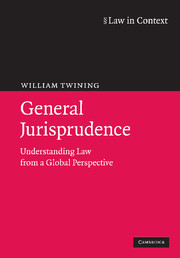Book contents
- Frontmatter
- Contents
- Preface
- Acknowledgements
- List of abbreviations
- Further abbreviations
- Part A
- Part B
- 9 Diffusion of law: A global perspective
- 10 Surface law
- 11 Is law important? Law and the Millennium Development Goals
- 12 The significance of non-state law
- 13 Human rights: Southern voices
- 14 Conclusion
- Bibliography
- Index
13 - Human rights: Southern voices
Francis Deng, Abdullahi An-Na'im, Yash Ghai and Upendra Baxi
Published online by Cambridge University Press: 05 June 2012
- Frontmatter
- Contents
- Preface
- Acknowledgements
- List of abbreviations
- Further abbreviations
- Part A
- Part B
- 9 Diffusion of law: A global perspective
- 10 Surface law
- 11 Is law important? Law and the Millennium Development Goals
- 12 The significance of non-state law
- 13 Human rights: Southern voices
- 14 Conclusion
- Bibliography
- Index
Summary
Introduction
In Ahdaf Soueif's novel, The Map of Love, an Egyptian woman, Amal, is expecting an American visitor: ‘Wary and weary in advance: an American woman – a journalist, she had said on the phone. But she said Amal's brother had told her to call and so Amal agreed to see her. And braced herself: the fundamentalists, the veil, the cold peace, polygamy, women's status in Islam, female genital mutilation – which would it be?’
Amal is a cosmopolitan scholar, who moves easily between the worlds of Cairo, New York, and Europe. She is weary of the simplistic repetitious stereotyping of Egypt, Arab culture, and Islam by Westerners. Western normative jurisprudence faces similar charges of a repetitious parochialism about its agenda and about the bearing of other traditions on normative questions.
Western jurispudence has a long tradition of universalism in ethics. Natural law, classical utilitarianism, Kantianism, and modern theories of human rights have all been universalist in tendency. But nearly all such theories have been developed and debated with at most only tangential reference to, and in almost complete ignorance of, the religious and moral beliefs and traditions of the rest of humankind. When differing cultural values are discussed, even the agenda of issues has a stereotypically Western bias. How can one seriously claim to be a universalist if one is ethnocentrically unaware of the ideas and values of other belief systems and traditions?
- Type
- Chapter
- Information
- General JurisprudenceUnderstanding Law from a Global Perspective, pp. 376 - 442Publisher: Cambridge University PressPrint publication year: 2009

